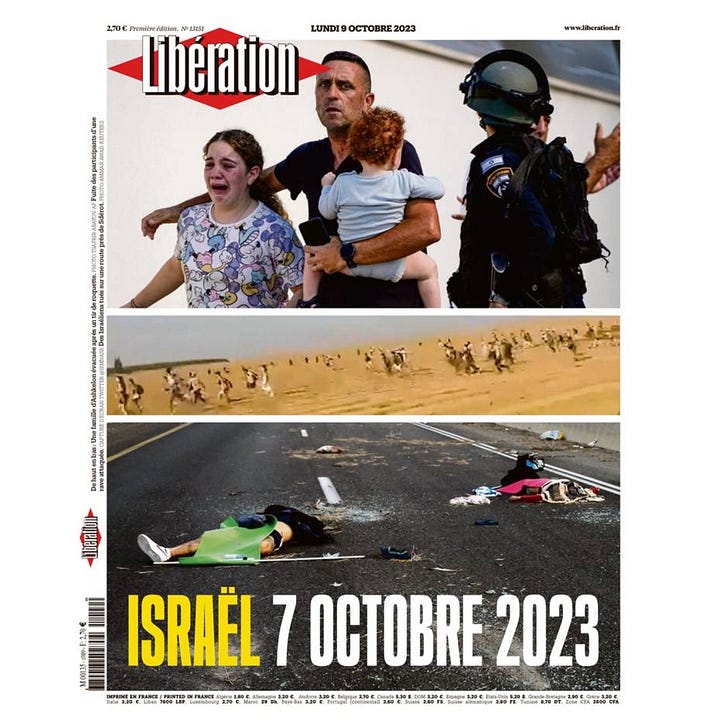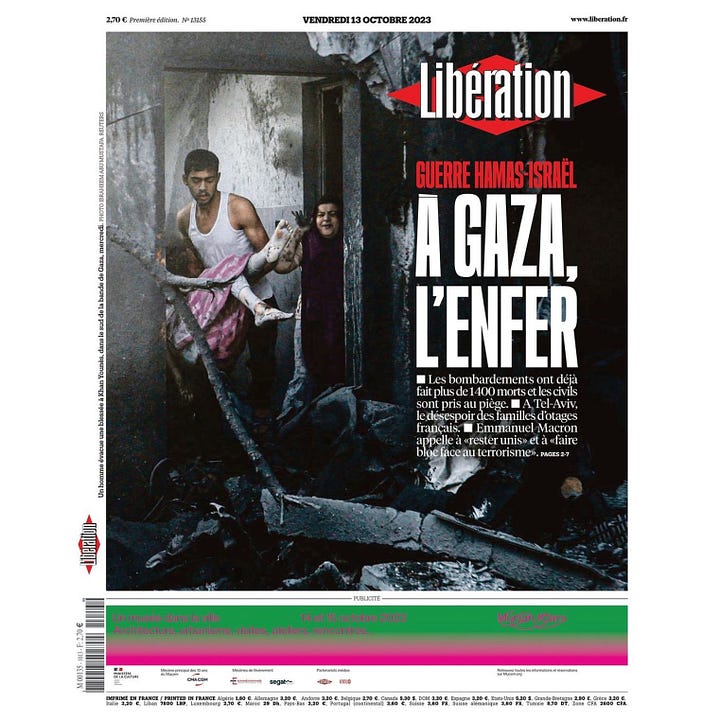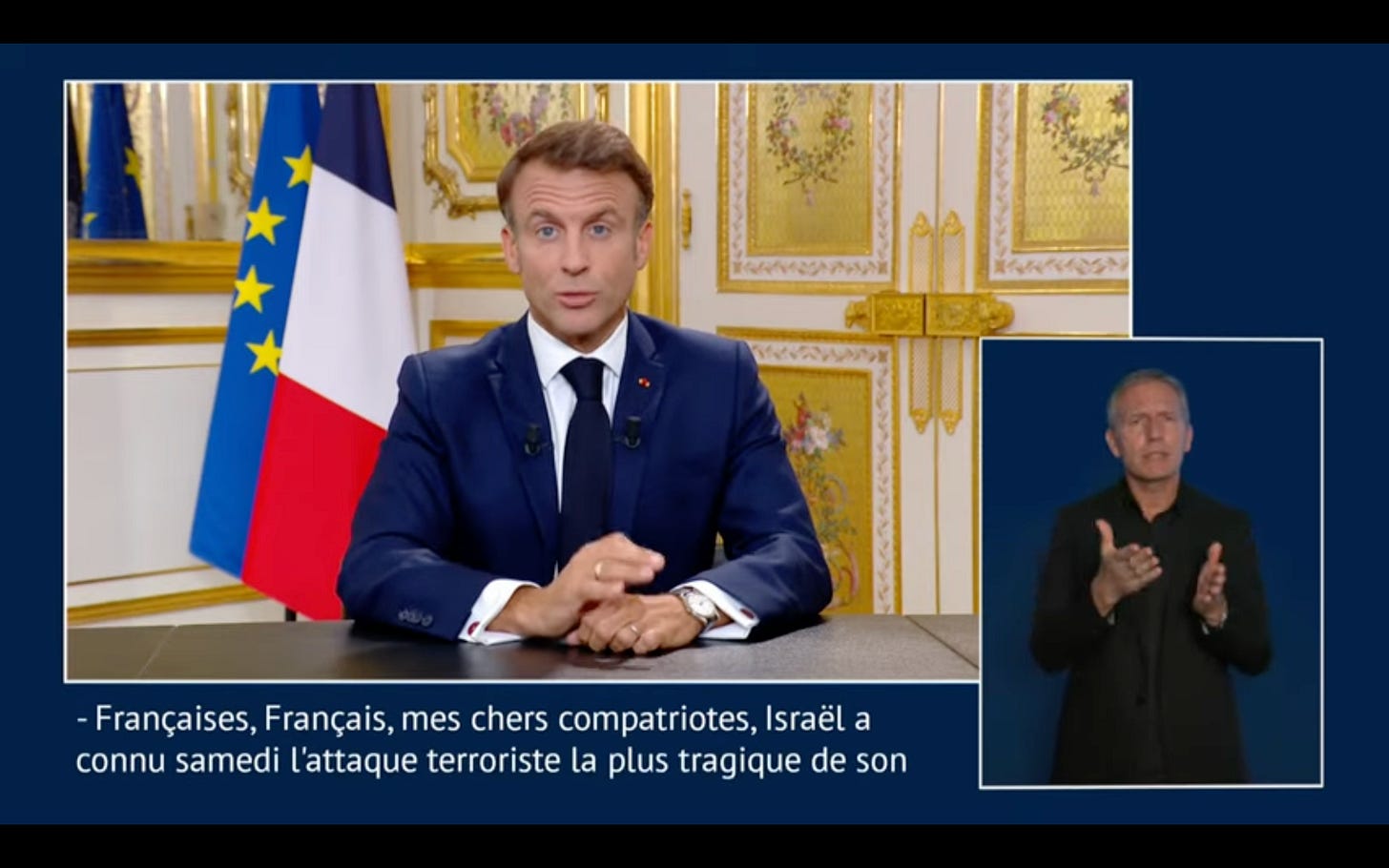At the moment this newsletter is being sent to your inbox and published online, it’s 2 p.m. in France, and schools across the country are observing a minute of silence. On Friday, Dominique Bernard, a high school literature teacher in the small northern city of Arras, was stabbed to death on school grounds by a former student. Three other staff members of the school were injured as they attempted to subdue the attacker. President Emmanuel Macron rushed to the Gambetta-Carnot high school, the site of the attack, where he denounced the “barbarity of Islamist terrorism.”
Bernard’s tragic death came almost exactly three years after that of Samuel Paty, a middle school history and geography teacher who was beheaded in an Islamist terror attack near the school where he taught on October 16, 2020. For the French, the killing of a teacher strikes at the heart of the Republic. According to the national education ministry, “without education, the transmission of the values of the Republic cannot be ensured.” For this reason, schools are a crucial site of contestation for France’s most challenging social issues, including secularism (laïcité). In turn, attacking a teacher can be read as attacking the idea of France itself. Three years after the trauma of Paty’s death, teachers, students, families and all of society again find themselves shocked and in mourning.
In a sobering coincidence, the ceremony of the third edition of the Samuel Paty Prize — given by the history and geography teachers’ association to honor work on “democratic principles and values at the heart of students' intellectual and civic development” — took place at the Sorbonne, in Paris, the day after the attack in Arras. Prime Minister Élisabeth Borne and Gabriel Attal, the education minister, attended. In her speech, Borne emphasized that “school is the breeding ground of the Republic: we enter as students and leave as citizens, and we owe this school to our teachers.”
On Sunday, the residents of Arras came together 5,000-strong in the central Place des Héros (Heros Square) to honor the memory of Dominique Bernard. From Libération:
On Sunday, in the square warmed by a beautiful light, three years almost to the day after the assassination of Samuel Paty, many faces are crying. As if the emotion contained until then was finally overflowing. Teachers hug each other, most struggle to speak.
— Marie Piquemal and Stéphanie Maurice
France reacts to the Israel-Hamas war
Of course, the attack came against the devastating backdrop of war in Israel and Gaza. Since Hamas’s deadly terrorist attacks and kidnappings and Israeli Prime Minister Benjamin Netanyahu’s declaration that Israel is “at war” last weekend, the conflict has dominated French news.


In addition to documenting and analyzing the unfolding war, much of the coverage hinges on whether there will be an “importation of the conflict” in France. Appearing on Quotidien, a nightly news and entertainment show, Gérald Darmanin, the interior minister, on Tuesday noted that roughly 50 antisemitic crimes had been reported since last Saturday, and that 10,000 police officers were posted to 500 places frequented by the Jewish community. When asked about the current terrorist threat in France, he called it “very strong” and noted that the authorities foil a terrorist plot every two months. The interview took place three days before the attack in Arras.
While the motives of Dominique Bernard’s attacker remain to be clarified, the Israel-Hamas war (as the press calls it) is already reverberating through French politics. On Thursday, Darmanin banned pro-Palestinian demonstrations “because they are likely to generate disturbances to public order.” However, demonstrations went ahead in several cities, including Paris, Rennes and Bordeaux.
The conflict also put the Nupes (Nouvelle Union populaire écologique et sociale, or New Ecological and Social People's Union) in jeopardy. The Nupes, a coalition of the left-wing La France Insoumise (LFI), ecologists, socialists and communists, has allowed the left to assert itself in the National Assembly even as each of its component parties remains relatively weak in the legislature. Mathilde Panot, leader of LFI in the Assembly, has refused to call Hamas a terrorist organization, instead accusing it of “war crimes.” In response, the Nupes’s other component parties have distanced themselves from LFI. In an interview with Le Monde, the LFI deputy François Ruffin also contradicted Panot, calling Hamas a “fanatical terrorist organization” and saying that the official line wasn’t “up to the seriousness of the events.” The coalition is currently “hanging by a thread,” with the socialist group announcing the “suspension” of its participation in Nupes meetings.
In an 11-minute speech delivered from the Élysée on Thursday evening, Macron emphasized France’s solidarity with Israel, noting that 13 French citizens had been killed and 17 missing. He also referred to the echoes of the terrorist attack at the Bataclan nightclub in November 2015:
We French know, in our flesh, what this pain is. We too have mourned victims cut down at a party, in their carefree youth, in the ordinary life of a family.
Macron went on to say that “Israel has the right to defend itself by eliminating terrorist groups, including Hamas, through targeted actions, while preserving civilian populations, because this is the duty of democracies.” Earlier in the week, Macron had criticized the European Commission for its initial decision to suspend development aid to Palestinians. (The Commission subsequently reversed course, saying it would “review” its financial assistance in consultation with the 27 European Union member states, and it also tripled humanitarian aid to Gaza on Saturday.)
The fog of war
Following Israel’s evacuation order to northern Gaza on Friday, and United Nations Secretary-General António Guterres’s call for the order to be withdrawn due to its “devastating humanitarian consequences,” pressure continues to mount on the UN Security Council, of which France is a permanent member, to act. In light of last week’s terrorist attack in Arras and the escalation of the conflict in Gaza, balancing France’s many commitments — including protecting its citizens at home and abroad, demonstrating solidarity with Israel, and ensuring adherence to international humanitarian and human rights law in Gaza — will be easier said than done.
What did I miss? What questions do you have? Let me know in the comments!





Nikhil, I find your comments very helpful, especially your reportage of Nupes. I was unaware of their divisions of opinion on the current Israel- Palestinian crisis. Merci!